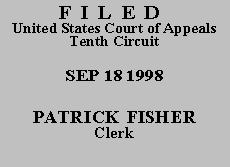

| TERESA D. WELLS,
Plaintiff-Appellant, v. KENNETH S. APFEL, Commissioner, Social Security Administration,(*) Defendant-Appellee. |
|
Plaintiff Teresa D. Wells appeals from the denial of supplemental security income benefits. She argues that the administrative law judge (ALJ) erred in finding that she does not suffer from chronic fatigue that interferes with her ability to perform the full range of sedentary work, and inappropriately shifted the burden back to her at step five to establish that she could not perform sedentary work. We have jurisdiction under 28 U.S.C. § 1291 and 42 U.S.C. § 405(g), and affirm.
Plaintiff was born on October 23, 1963, and was diagnosed with adult onset diabetes in May 1992. She requires insulin and has been prescribed exercise and a specific diet to help manage her disease. She alleges that she has been disabled since October 7, 1993. She has a seventh grade education, and has worked in the snack bar at a Walmart store and at a Dairy Queen.
The ALJ denied plaintiff's claim at step five of the evaluation sequence. See generally Williams v. Bowen, 844 F.2d 748, 750-52 (10th Cir. 1988). He concluded at step three that plaintiff did not meet any of the listings, and decided at step four that plaintiff could not return to her past type of work. He then determined that plaintiff nevertheless retains the residual functional capacity (RFC) to perform the full range of sedentary work unlimited by any significant nonexertional impairments. He noted in particular that one of plaintiff's physicians was of the opinion that she was not disabled "'unless lack of common sense is an indication for a grant of disability.'" Appellant's App., Vol. II at 22 (quoting March 18, 1993 letter of Robert H. Hazelwood, M.D., Appellant's App., Vol. II at 155). Based on vocational testimony and the medical-vocational guidelines, the ALJ concluded that plaintiff is not disabled. The Appeals Council considered additional medical evidence but denied review, making the ALJ's decision the Commissioner's final decision.
Plaintiff then brought this suit. The magistrate judge found no error and recommended that the Commissioner's decision be affirmed. The district court summarily adopted the magistrate judge's recommendation.
We review the Commissioner's decision on the whole record to determine only whether the factual findings are supported by substantial evidence and the correct legal standards were applied. See Goatcher v. United States Dep't of Health & Human Servs., 52 F.3d 288, 289 (10th Cir. 1995). We may not reweigh the evidence or substitute our judgment for that of the agency. See Kelley v. Chater, 62 F.3d 335, 337 (10th Cir. 1995). Substantial evidence is "more than a mere scintilla. It means such relevant evidence as a reasonable mind might accept as adequate to support a conclusion." Richardson v. Perales, 402 U.S. 389, 401 (1971) (quotation omitted).
Under these standards, we find no error in the ALJ's factual findings or legal analysis. Plaintiff maintains that her alleged chronic fatigue is caused by blood sugar readings over 200. Although the medical evidence is not completely one-sided, substantial evidence shows that plaintiff has high blood sugar only periodically in the evening, and her diabetes is otherwise well controlled. See, e.g., Appellant's App., Vol. II at 181-83, 187, 200. Because there is substantial evidence showing that plaintiff's blood sugar is not persistently high, the ALJ's finding that plaintiff does not suffer significant fatigue is also supported by substantial evidence. This is not a case in which the ALJ relied on "the absence of evidence" to reach his decision. See Thompson v. Sullivan, 987 F.2d 1482, 1491 (10th Cir. 1993). He did not improperly shift the burden at step five back to plaintiff. Rather, plaintiff had the burden at all steps of the sequential evaluation process to provide objective medical evidence that her blood sugar is persistently high. See 42 U.S.C. § 423(d)(5); 20 C.F.R. §§ 416.908, 416.912, 416.928.
The judgment of the district court is AFFIRMED.
Entered for the Court
Circuit Judge
*. Pursuant to Fed. R. App. P. 43(c), Kenneth S. Apfel is substituted for John J. Callahan, former Acting Commissioner of Social Security, as the defendant in this action.
**. This order and judgment is not binding precedent, except under the doctrines of law of the case, res judicata, and collateral estoppel. The court generally disfavors the citation of orders and judgments; nevertheless, an order and judgment may be cited under the terms and conditions of 10th Cir. R. 36.3.